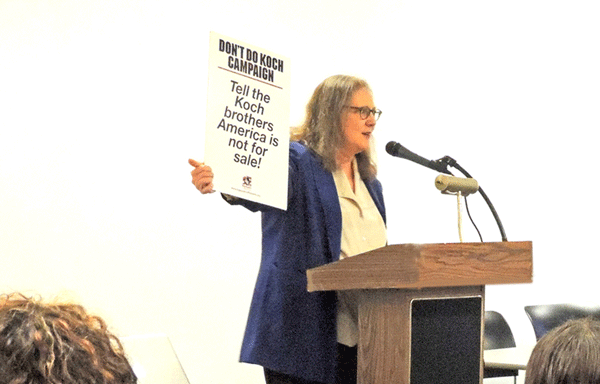
BY DONATHAN SALKALN (CRDC Executive Board Communications Chair) | Rarely has a Supreme Court decision indirectly affected middle class and low-income Americans more than that of Citizens United. The ruling has created corporate and wealth driven Super PACs — which have, in turn, changed the political landscape into one-sided, mud-slinging and multi-media beat-downs of opposing candidates (more often than not, Democrats).
The Chelsea Reform Democratic Club’s April meeting at Hudson Guild’s Chelsea/Elliott Community Center (441 W. 26th St.) listened to a battle-tested group called the Big Apple Coffee Party, who is entrenched in their fifth year of advocating the inequalities and injustices of the Citizens United verdict. The 2010 Supreme Court ruling, in essence, now allows unlimited antes at the political poker table. Special interests with big stacks of money have since taken up all the table’s seats, leaving the average Joe (and Jeanine) out in the parking lot.
“The Supreme Court came to a decision that fundamentally altered campaign financing and the people’s ability to control corporate influences of elected officials,” said Penny Mintz, Esq., one of three Coffee Party representatives that spoke. “We want to stem the corruption that results when corporations are able to spend all this money to essentially buy candidates.”
With little hope of a Constitutional Amendment to overturn Citizens United (it requires a two-thirds vote from both houses of Congress) or an act by the Supreme Court in admitting to their own mistake (“It’s not going to happen in our lifetime,” says Mintz), the Big Apple Coffee Party has waged their campaign on the streets. Armed with ‘Don’t do Koch’ flyers promoting the boycott of products made by the Koch brother’s company, Georgia Pacific, Coffee Party activists engage shoppers outside of supermarkets.
Their strategy has been to disband Citizens United, one citizen at a time. It doesn’t hurt that at a quick glance, their handout flyer appears to be a sheet of store coupons. Sally Swisher, a founding member of the Big Apple Coffee Party noted, “The flyering not only works toward getting money out of politics, it opens discussion and demonstrates what democracy can and should be.” The group even coordinated a simultaneous supermarket flyering campaign in 10 states, teaming up with other Coffee Party chapters and sympathetic groups. “It was the most exciting thing,” recalled Swisher.
Although the Coffee Party can trace their roots to coffee houses in pre-revolutionary times, back when the East India Company was selling highly taxed British tea, these activists are not drinking mugs of java, followed by loading muskets. Says Jonathan Riess, 25-year “money veteran” as a Wall Street global investment manager, “We are committed to diversity and civil discourse, acting independently of political parties, corporations and political lobbying networks.” Big Apple Coffee Party meets every second Thursday at the Church of St. Paul and St. Andrew (86th St. & West End Ave.), where they organize and strategize while also discussing related issues, such as the Trans-Pacific Partnership and the impact that mega-foundations have on the democracy.
During the presentation, the meetings moderator, CRDC Exec. VP Judy Richheimer had to check the refreshment table to see if any boycott products were on display. Thankfully not!
For a list of boycott products, visit dontdokoch.org or bigapplecoffeeparty.com.

































